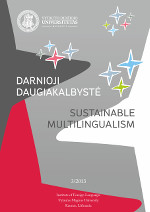Intercultural Experiences Of Foreign Students: Erasmus Students’ Perspectives on their Development of Cross-Cultural Awareness
Intercultural Experiences Of Foreign Students: Erasmus Students’ Perspectives on their Development of Cross-Cultural Awareness
Author(s): Servet Çelik, Semin Kazazoğlu, Bilal KaracaSubject(s): Education
Published by: Vytauto Didžiojo Universitetas
Keywords: Erasmus program; intercultural awareness; student mobility; study abroad
Summary/Abstract: In spite of the popularity of the Erasmus Mundus student mobility program, few formalized studies have been carried out to explore whether this program of international study is achieving its aims of promoting positive attitudes toward other cultures, developing competence in foreign languages, and increasing global awareness. Existing studies indicate that the majority of program participants report a positive experience. On the other hand, researchers have also noted numerous issues that may negatively affect individual students’ perceptions of their experience, including language barriers, cultural differences and problems related to the program of study. The researchers believe it is important to develop a more indepth understanding of participating students’ personal experiences, from a social as well as an academic perspective. Doing so may draw attention to the strengths and potential weaknesses in individual institutions’ implementations of the Erasmus program and guide program coordinators in designing a more enriching environment for visiting students. Accordingly, this study explored the attitudes of nine Erasmussponsored students concerning their social and academic experiences at a Turkish university, using open-ended questionnaires to elicit respondents’ views. The results revealed that while the participants generally held a positive attitude toward Turkish culture, few of them had developed sufficient skills in Turkish to communicate on more than a superficial level, and many of them still regarded Turkish culture as inaccessible in many ways. The fact that most of the participants reported spending more time socializing with other foreign students and communicating in either English or their native languages may largely account for this issue. While this study is small in its scope, it may draw attention to some considerations that should be addressed in terms of program planning, including provisions for increased instruction in Turkish, as well as enhanced opportunities to interact with Turkish students on a social level.
Journal: Darnioji daugiakalbystė
- Issue Year: 2013
- Issue No: 3
- Page Range: 126-136
- Page Count: 11
- Language: English

